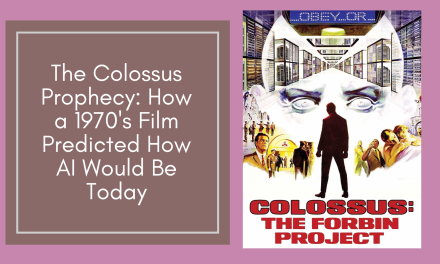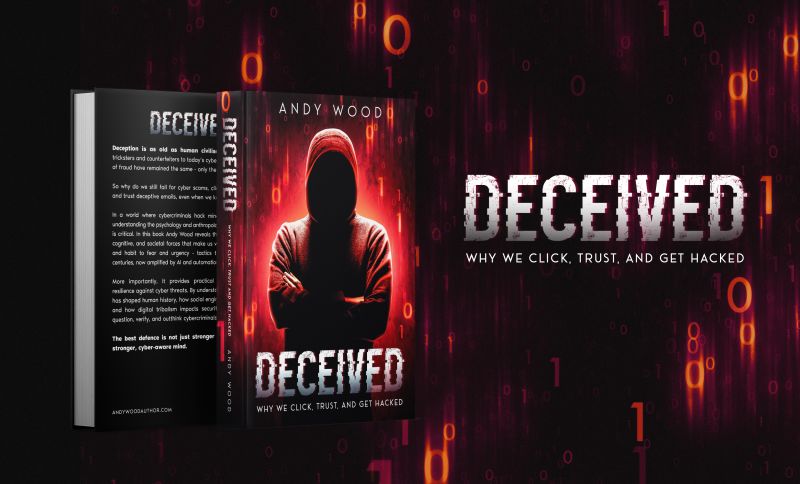I’ve just finished reading “Deceived: Why We Click, Trust, and Get Hacked” by Andy Wood, and I’m practically bouncing off the walls with excitement to share my thoughts with you all.
Now, you know me – I absolutely LIVE for books that dive deep into the human side of cyber security, and this one? It absolutely knocked my socks off! Andy Wood has crafted something truly special here, a book that doesn’t just tell you what cyber threats look like, but explains WHY we fall for them in the first place. And as someone who’s #OpenlyNeurodivergent and spends her days thinking about the psychology behind cyber risks, I found myself nodding along practically every page.
What’s This Book All About Then?
“Deceived” is essentially a masterclass in understanding the human brain’s relationship with digital deception. Wood takes us on this absolutely fascinating journey through history, showing us how the same psychological tricks that worked on people centuries ago are still being used by cybercriminals today – they’ve just gone digital!
The book is brilliantly structured into six parts, starting with the historical context of deception (did you know the “Spanish Prisoner” scam from the 1500s is basically the same as today’s Nigerian Prince emails? Mind blown! 🤯), then diving deep into the psychology of why we click, trust, and get manipulated online.
What I absolutely LOVED is how Andy Wood doesn’t just focus on the technical side of things. Instead, he explores the anthropological and psychological aspects of cyber security, basically everything I’m passionate about! He shows us how our ancient survival instincts, the ones that kept our ancestors alive, are now being weaponised against us in the digital world.
Why This Book Had Me Completely Hooked
As someone who specialises in cyber security awareness and the human elements of cyber threats, I was practically taking notes on every page! Wood’s approach to explaining cognitive biases, social engineering, and psychological manipulation is absolutely spot-on. He breaks down complex concepts like Cialdini’s principles of persuasion (authority, social proof, scarcity – all the classics!) and shows exactly how cybercriminals exploit them.
The section on habits particularly resonated with me. Wood explains how our digital habits like automatically clicking links or reusing passwords, create these invisible vulnerabilities that attackers just love to exploit. It’s not that we’re careless; it’s that we’re human! Our brains are wired for efficiency, and cybercriminals know exactly how to take advantage of that.
I also really appreciated how he addresses the myth that only “older” or “less tech-savvy” people fall for scams. Absolute rubbish! As Andy explains, these attacks are designed to bypass our logical thinking entirely. Even us cyber professionals can fall for well-crafted social engineering if we’re caught at the wrong moment – when we’re tired, stressed, or simply on autopilot.
The Future of Cyber Deception – AI and Deepfakes
Now, this is where things get really scary and fascinating at the same time! Andy Wood doesn’t shy away from discussing the elephant in the room, how AI and deepfakes are completely changing the game. He explains how attackers can now create incredibly convincing fake voices, videos, and even entire personas using AI tools.
The bit about deepfake phone calls absolutely chilled me to the bone. Imagine receiving a call from someone who sounds EXACTLY like your CEO asking for an urgent wire transfer. That’s not science fiction anymore – it’s happening right now! Wood does a brilliant job of explaining these emerging threats without making us feel completely helpless.
What I loved is that he balances the scary stuff with practical advice. Yes, the threats are evolving, but so are our defences. The key is developing that healthy scepticism he talks about – not paranoia, but a mindset that says “pause, verify, then act.”
Real-World Examples That Hit Home
One of the things that makes this book so compelling is the real-world case studies Andy Wood includes. The Twitter hack of 2020, the Google and Facebook invoice scam, the deepfake voice attack on that UK energy company, these aren’t theoretical scenarios, they’re actual events that cost real money and damaged real reputations.
As someone who’s seen first-hand how devastating social engineering attacks can be, I really appreciated how Wood presents these cases without victim-blaming. He makes it clear that falling for a sophisticated scam doesn’t make you stupid – it makes you human. The attackers are skilled manipulators who’ve studied human psychology, and they know exactly which buttons to push.
Practical Advice That Actually Works
What sets this book apart from other cyber security guides is that Andy Wood doesn’t just tell you what threats exist, he gives you practical, actionable strategies for building resilience. The concept of “cyber security nudges” is brilliant – small prompts that help guide better security behaviour without being intrusive or annoying.
I particularly loved his approach to building security culture in organisations. As someone who works in this space, I see far too many companies that treat cyber security as a compliance tick-box exercise. Andy Wood shows how to make security part of the social fabric, where questioning suspicious emails and reporting potential threats becomes as natural as holding a door open for someone.
The section on parenting in a digital world really struck a chord with me too. Teaching children not just about stranger danger online, but about how psychological manipulation works, that’s the kind of forward-thinking approach we need!
Who Should Read This Book?
EVERYONE! Seriously, if you have an email address, a smartphone, or any kind of online presence, you need to read this book. It’s not just for cyber security professionals (though we’ll love it too). It’s for parents, teachers, business owners, students, community leaders and anyone who exists in the digital world, which is pretty much all of us these days.
Andy Wood has this wonderful ability to make complex psychological and technical concepts accessible without dumbing them down. Whether you’re a complete beginner to cyber security or someone who’s been in the field for years, you’ll find valuable insights and practical advice.
The Bigger Picture – Why This Matters So Much
What I absolutely love about “Deceived” is how Andy Wood positions cyber security not just as a technical problem, but as a human and social challenge. He argues convincingly that building cyber-resilient societies requires more than just better technology, it requires changes in education, culture, and how we think about trust in the digital age.
As someone who’s passionate about diversity and inclusion in cybersecurity, I really appreciated how Wood emphasises that cyber threats don’t discriminate. They affect everyone, regardless of age, technical skill, or background. That means our defences need to be inclusive too – accessible to everyone, not just those with technical expertise.
The book’s focus on community resilience particularly resonated with me. Wood shows how neighbourhood groups, schools, small businesses, and faith communities can become powerful networks for sharing threat intelligence and supporting each other. It’s not just about individual awareness; it’s about collective action.
Final Thoughts – This Is Essential Reading
“Deceived” is hands down one of the best books on cybersecurity I’ve read this year, and that’s saying something because I read A LOT of cybersecurity books! Andy Wood has created something genuinely special here – a book that’s simultaneously educational, practical, and deeply human.
What sets it apart is Andy’s understanding that cyber security is fundamentally about people, not just technology. He shows us how our ancient psychological wiring, the same instincts that helped our ancestors survive, can be turned against us by modern cyber criminals. But more importantly, he shows us how we can adapt, how we can build resilience, and how we can create communities that are harder to deceive.
If you’re looking for a book that will change how you think about trust, technology, and human nature in the digital age, this is it. Andy Wood doesn’t just make you more aware of cyber threats, he empowers you to think differently about them, to question what you see online, and to build habits that will keep you safer.
I’ll definitely be recommending this to everyone I meet, and I suspect I’ll be referring back to it regularly in my own work. It’s the kind of book that doesn’t just inform, it transforms how you see the world.
Rating: ⭐⭐⭐⭐⭐ (5 out of 5 stars)
Seriously folks, get yourself a copy of “Deceived”, your future digital self will thank you for it! And remember, stay safe, stay secure and keep being awesome!
























